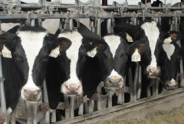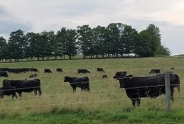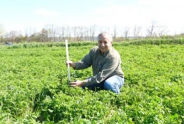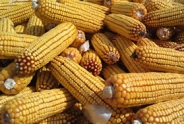Field Crop Update, September 15, 2022
Erik Smith, Area Field Crop Specialist/Team Leader
Central New York Dairy and Field Crops
1. Announcements:
With soybean harvest approaching, please be on the lookout for any parts of the field that look like the picture below. This field turned out to be infested with soybean cyst nematode (SCN), a microscopic soil-borne roundworm that can rob as much as 30% of your yield before plants show any symptoms. In this field, plants dried-down and defoliated prematurely, showing me exactly where to sample. This year we have funding from the NY Corn and Soybean Growers Association to sample up to 75 soybean fields in NY for this pest. Some growers have already heard from me regarding sampling their fields this year, but if you haven't and you would like Erik Smith to sample one or more of your fields, please contact him at 315-219-7786 or eas56@cornell.edu.
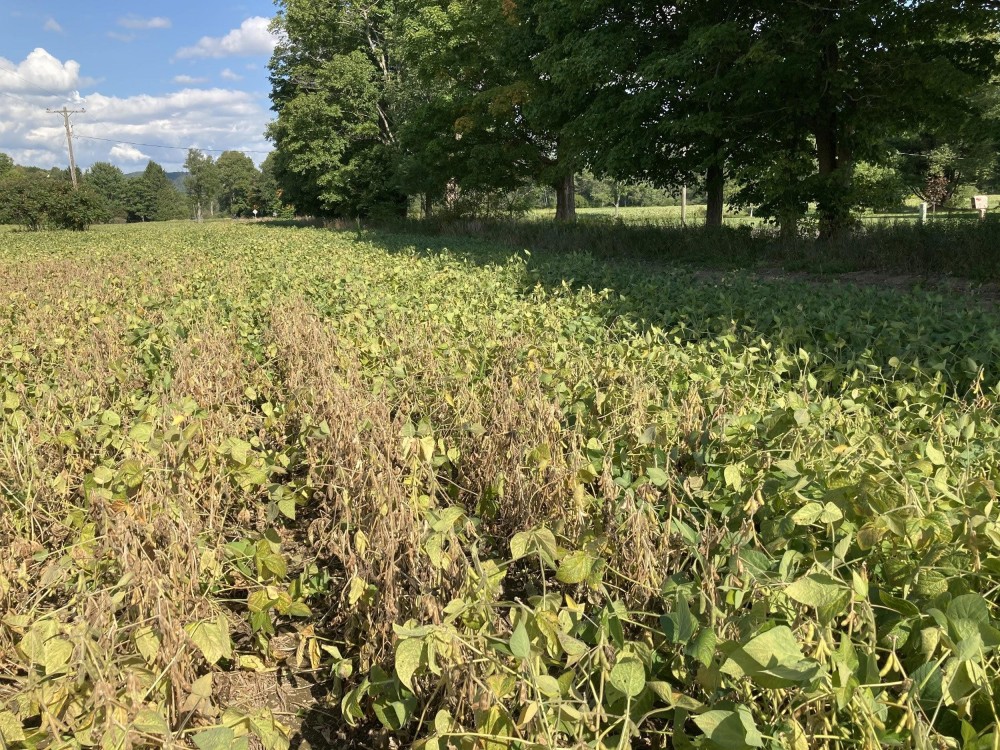
2. Field Observations
Lots of silage harvest activity happening today and through this weekend. With clear skies over the next 3-4 days, I'm sure many of us will take advantage. So be safe!
During our recent rainy weather, Cornell's silage trails showed some very interesting data. While a rain event lowered DM% for around a day, dry-down was right back on-schedule very soon after:
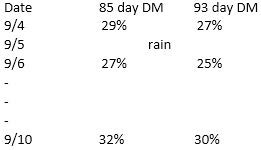
The stalks will take up the moisture from a rain event, but that effect is very short-lived. The ears are not taking up moisture in the same way and are continuing to dry down.
Check your silage crops' whole plant dry matter to make sure you're ready to harvest - your crop may be ready before you know it. See our recent emails regarding Corn Plant Dry Down and Kernel Processing. Here's a reminder from Joe Lawrence (PRO-DAIRY):
"The status of the corn crop is highly dependent on where you are in the state this year but in areas with drought stress (but not complete plant death from drought) it will be really important to watch kernel maturity in combination with whole plant dry matter. In these fields the plants look pretty ugly but the kernels continue to attempt to mature. You will see in the attached that the year and health of the plants makes a difference in how much ear DM contributes to whole plant DM vs. stover DM. For this droughty scenario this could look more like the data from 2019 where the plants are not healthy and therefore contribute slightly more to whole plant DM but ear DM is still driving the dry down process and patience is needed to allow this to happen: Corn Plant Dry Down
To assess the effectiveness of this year's nutrient plan, see this factsheet and this factsheet on the Corn Stalk Nitrate Test.
3. Growing Degree Days as of 13 Sept: See: Climate Smart Farming Growing Degree Day Calculator
Growing degree days (GDD) are calculated by taking the average daily temperature and subtracting the base temperature for development of a given organism ((High + Low)/2 - base temp = GDD). For corn silage, we are using base 50/86, as corn development starts at 50 degrees F and ceases above 86. Check your location, planting date, and silking date. Silage corn needs 750-800 GDD (depending on hybrid maturity) after silking to reach a whole plant DM of 32%. Under typical late season dry down conditions we can expect the crop to reach 35% DM four to seven days later (Remember that we can expect to accumulate 20-25 GDD per day, or even up to 30, so this is not a large window). For more details, see this article. No matter what the numbers say, always check your crop to see how close you may be to harvest:

Blue: Time to make plans (35% DM anywhere between 5 - 11 days from now, depending on maturity)
Green: Gas up the harvester and the trucks (35% DM in 2 - 8 days, depending on maturity)
Yellow: See you in the field (35% now or in a few days)
Red: It's either already in the bunk or it's going in the bin or for high-moisture corn (DM likely > 35-40%)
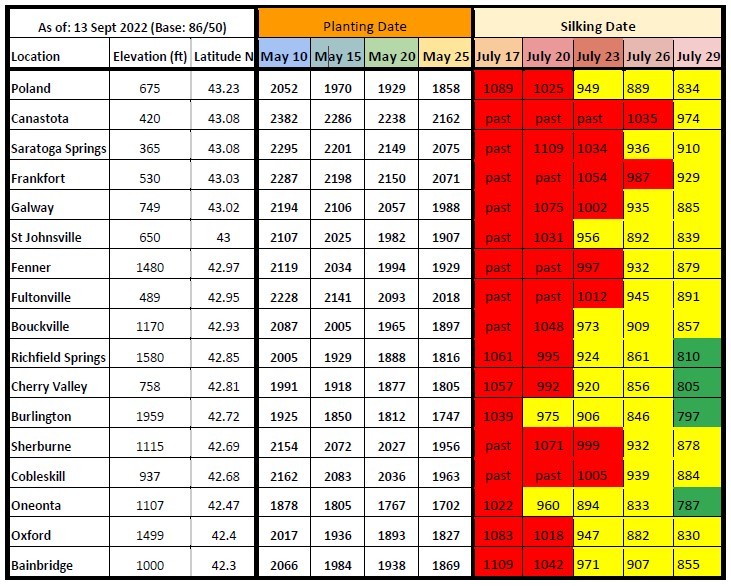
Field Crop Update, September 15, 2022 (pdf; 1460KB)
Upcoming Events
2026 Dairy Day
January 13, 2026 : Dairy Day - Hamilton
Hamilton, NY
Lunch included
January 14, 2026 : Dairy Day - Ballston Spa
Ballston Spa, NY
Lunch included
I Thought I Was Covered for That! - Farm Insurance Webinar Series
January 13, 2026
January 20, 2026
January 27, 2026
February 3, 2026
February 10, 2026
Free Webinar Series
2026 Corn & Soybean Day
January 20, 2026 : Corn & Soybean Day - Hamilton
Hamilton, NY
Lunch included. 2.75 DEC Credits available
January 21, 2026 : Corn & Soybean Day - Ballston Spa
Ballston Spa, NY
Lunch included. 2.75 DEC Credits available
Announcements
Statewide Field Crop Pathology Needs Assessment Survey
Your input is wanted for identifying priorities!Sign Up for Our Weekly E-Newsletter
We send out a bi-weekly e-newsletter that has announcements, upcoming programs, and opportunities for you! Registration is quick, easy, and free. Click here to sign up today!Farmers Can Join MeatSuite For Free!
MeatSuite.com is a free resource provided by Cornell University where NY meat farmers can create a farm profile and list their bulk (wholes, halves, quarters) and bundled (i.e. Grilling Bundle) meat products.Why should farmers join?
1. It's free and easy!
2. Connect with more local customers. In the past year the MeatSuite.com farm directory had 8,300 visits from New York consumers. Farm profiles get as many as 25 views per month from potential local customers. We also spotlight MeatSuite farms on social media and bring attention and purchases to farms through highlights and giveaways.
How do I join?
Farmers can visit https://www.meatsuite.com/farmers/ to create a free farm profile. You must list at least one product for your farm's profile to go live. You'll also have access to Cornell's free Meat Price Calculator, a helpful tool for pricing your meat to make a profit.
While you're on MeatSuite, check out the "Creating Consumer-Friendly Bulk Meats" publication on the log-in page. It has tips on how to create bulk meat products that are easier for first-time buyers to say "yes" to.
If you have any questions as you create your farm profile or products, we're here to help! Please email Matt LeRoux at mnl28@cornell.edu.

